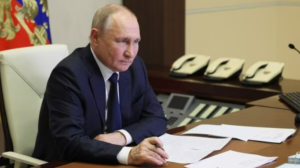Vladimir Putin’s recent inauguration for his fifth term as Russia’s leader has sparked global attention and controversy, marked by a ceremony that highlighted Russia’s ongoing conflicts with the West and its assertive foreign policy. This article delves into the significance of Putin’s continued leadership, the reactions from Western nations, and the potential implications for Russia’s domestic and international affairs.

Putin’s Fifth Term: A Controversial Start The ceremony, boycotted by the UK, US, and most European envoys, underscored the strained relations between Russia and the Western world. Despite criticisms of an uncompetitive election and concerns about Russia’s actions in Ukraine, Putin’s inauguration solidified his position at the helm of Russian politics, potentially extending his rule for decades.
Foreign Policy and International Tensions In his inauguration speech, Putin reaffirmed Russia’s assertive foreign policy, emphasizing the defense of national interests amid ongoing conflicts and sanctions. The rhetoric of defiance and determination suggests a continuation of Russia’s confrontational stance towards the West, raising questions about the prospects for diplomatic resolutions and regional stability.
Domestic Challenges and Policy Shifts Putin’s fifth term comes at a challenging juncture for Russia’s economy and governance. The need for belt-tightening measures, including potential tax increases, reflects the economic strains caused by the war in Ukraine and Western sanctions. A government shake-up, indicated by the dissolution of the cabinet, signals a possible period of policy adjustments and reforms aimed at addressing internal challenges.
Western Diplomatic Boycott and International Responses The absence of Western diplomats at the inauguration symbolizes the deepening rift between Russia and Western powers. While some European countries sent representatives, the overall diplomatic snub highlights the erosion of trust and cooperation on key international issues. The recall of ambassadors and accusations of cyber-attacks further exacerbate tensions, indicating a turbulent period ahead for diplomatic relations.
Opposition Voices and Criticisms Putin’s opponents used the inauguration to voice concerns about Russia’s trajectory under his leadership. Criticisms of authoritarianism, political assassinations, and human rights violations reflect ongoing domestic dissent and international condemnation. The role of opposition figures and civil society in challenging Putin’s authority remains a focal point of scrutiny and debate.
Also Read : Putin’s luxury gift to Kim Jong Un raises concerns over UN sanctions
Putin’s Longevity and Historical Comparisons Putin’s extended tenure as Russia’s leader draws comparisons to historical figures, including Joseph Stalin, raising questions about the consolidation of power and democratic norms. The comparison to medieval prince Alexander Nevsky by the Russian Patriarch adds a religious and historical dimension to Putin’s leadership narrative, emphasizing notions of strength and decisive leadership.
Future Prospects and Challenges As Putin embarks on his fifth term, the trajectory of Russia’s domestic and foreign policies will be closely watched. The balance between assertive foreign engagements, economic stability, and internal reforms will shape Russia’s role on the global stage. The potential for further confrontations with the West or avenues for dialogue and cooperation remains uncertain, highlighting the complexities of Putin’s leadership and its impact on Russia and the world.
Conclusion Vladimir Putin’s fifth term inauguration reflects a pivotal moment in Russia’s political landscape, marked by international tensions, domestic challenges, and ongoing controversies. The repercussions of Putin’s continued leadership extend beyond Russia’s borders, shaping geopolitical dynamics and diplomatic relations in an increasingly complex global environment.